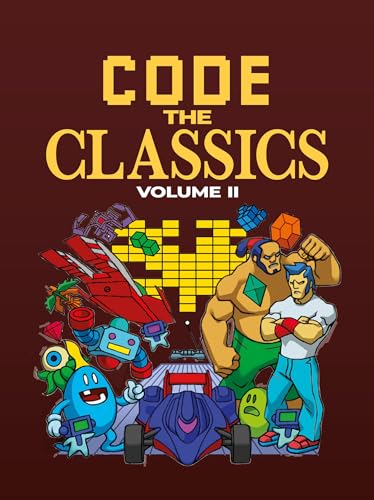
Code the Classics Volume II
Simon Brew, Andrew Gillett, Liz Upton
Publisher
Raspberry Pi Press
Publication Date
11/12/2024
ISBN
9781916868045
Pages
296
Categories
Questions & Answers
"Code the Classics Volume II" primarily focuses on teaching game development through the lens of classic arcade games. It aims to educate readers by providing step-by-step guides to recreate iconic games like Arkanoid, Defender, and Double Dragon using Python and Pygame Zero. The book combines historical insights into the original games' development with modern programming techniques, demonstrating the evolution of game development. By following the book's projects, readers learn fundamental programming concepts, game mechanics, and design principles, fostering a deeper understanding of game development.
The book "Code the Classics Volume II" leverages the concept of "recreating classic games" to teach programming and game design principles by providing step-by-step guides to develop games inspired by iconic titles like Arkanoid, Defender, and Double Dragon. By focusing on these classics, the book introduces fundamental programming concepts and game mechanics in a relatable and engaging manner. Each chapter presents a game, its history, and the programming techniques used to create it, allowing readers to learn through practical examples. This approach not only teaches the technical aspects of game development but also emphasizes design principles, problem-solving, and the evolution of the gaming industry.
"Code the Classics Volume II" highlights key historical games and developers that have significantly influenced modern game development. Notable games include:
- Breakout (Atari): The first successful block-breaking game, which inspired many clones and sequels, including Arkanoid.
- Defender (Williams Electronics): A pioneering side-scrolling shooter, known for its innovative controls and gameplay mechanics.
- Dizzy (The Oliver Twins): A popular action-adventure game series, known for its unique puzzles and gameplay.
- Double Dragon (Technōs Japan): A seminal beat-'em-up game, known for its two-player co-op and diverse combat mechanics.
- Pole Position (Namco): A groundbreaking racing game, known for its realistic graphics and gameplay.
Developers like:
- Eugene Jarvis: Creator of Defender, known for his innovative game designs and contributions to the arcade gaming industry.
- The Oliver Twins: Known for creating the Dizzy series, they have influenced the development of puzzle-solving and platform games.
- Yoshihisa Kishimoto: Known for his work on Double Dragon, he is considered the "grandfather" of the beat-'em-up genre.
- Tōru Iwatani: Creator of Pac-Man and Pole Position, known for his innovative game designs and contributions to the arcade gaming industry.
These games and developers have influenced modern game development by inspiring new game mechanics, storytelling, and art styles. Their innovative approaches to game design have set the foundation for many modern games, and their influence can still be seen in today's gaming landscape.
The book "Code the Classics Volume II" effectively balances historical context with modern programming techniques by focusing on classic games and explaining how to recreate them using contemporary tools like Python and Pygame Zero. This approach offers several benefits:
-
Educational Value: For beginners, understanding the original games' development process provides insight into the limitations and creativity of early game developers. This can inspire and motivate beginners to learn programming.
-
Skill Transfer: For experienced developers, the book serves as a refresher on foundational programming concepts and techniques, which can be applied to modern game development.
-
Inspiration: By examining classic games, developers can draw inspiration for new game ideas and mechanics, blending the nostalgia of the past with the innovation of the present.
-
Practical Application: The book's hands-on approach allows developers to apply historical knowledge to modern tools, enhancing their practical skills and understanding of game development principles.
-
Community Engagement: The book encourages collaboration and sharing, fostering a community of developers who appreciate both the history and the future of game development.
The interviews and insights in "Code the Classics Volume II" highlight the evolution of game development, emphasizing creativity, resourcefulness, and the importance of understanding game mechanics. Professionals like Mike Montgomery and Graeme Devine share their experiences, showcasing the challenges and rewards of creating games on limited hardware. Their stories underscore the value of passion, problem-solving, and collaboration. The book's message is that game development is not just about technology; it's about crafting engaging experiences. The professionals' insights contribute to this by illustrating the human element in game creation, from the initial spark of an idea to the final product, and the continuous learning and adaptation that define the industry.